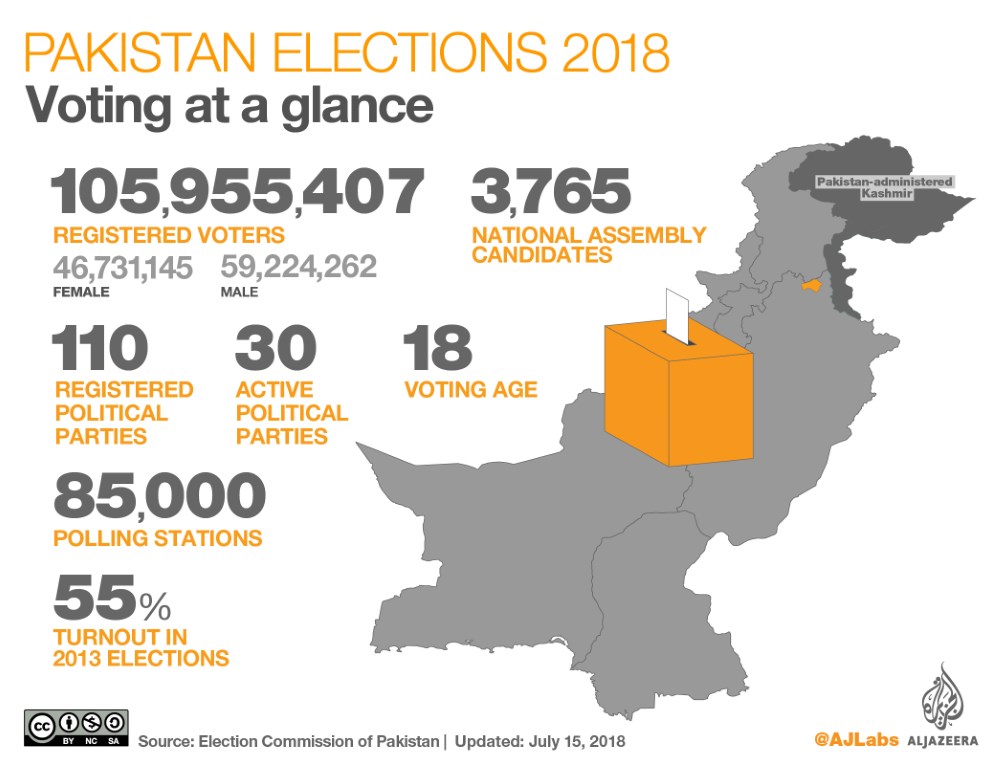Why Pakistan Needs A Civilian Government
July 23, 2018 | Expert Insights

Pakistan has oscillated between civilian and military rule since its independence. The military’s interference in the upcoming elections indicates trouble for the future of democracy in the country.
Background
The Islamic Republic of Pakistan is a country in South Asia, bordered by India, Afghanistan, China and Iran. It also shares a maritime border with Oman. Pakistan was the site of many ancient cultures, including the great Indus Valley Civilization. It is the only country to have been created in the name of Islam, born out of the partition of the Indian sub-continent in 1947. Its east wing seceded in 1971 to form the state of Bangladesh.
Since 1947, the nation has been run by military dictatorships three times. Muhammed Ayub Khan rose to power in 1958, laying the foundations of military rule. He suspended the constitution with the aim of seizing power, and established military relations with the US. He was forced to resign in the backdrop of the growing East Pakistan Movement. In 1977, Muhamed Zia-ul-Haq grabbed power in a coup. He promoted Islamization, turning against minorities and supporting the Mujahidin who were fighting the Soviets in Afghanistan. He had also ordered the execution of Zulfikar Ali Bhutto, one of Pakistan’s most beloved politicians. Shortly after his term, Pakistan detonated its first nuclear devices in 1998. Pervez Musharraf toppled Prime Minister Nawaz Sharif and stayed in power till 2008. He is considered responsible for pushing Pakistan into an unnecessary war on terrorism.
The military has remained one of the country’s most powerful institutions, and frequent martial law has changed the political culture of Pakistani society. Political parties have been dominated by dynastic rule, and there is little tolerance for opposition. The lack of acumen of Pakistan’s political class to formulate comprehensive strategies has given the military establishment reason to intervene. They have made extensive use of religion to win the support of the people. With military forces intent on determining the outcome of elections, citizens have become increasingly depoliticized, making political life stagnant.
Analysis
For a nation that is accustomed to military interference in politics, the current campaign for the elections scheduled to be held on 25 July stands out. It has been dubbed one of the most controversial and dirtiest in Pakistan’s recent history. There have been allegations of pre-poll rigging and political engineering to favor a certain political party with underlying sympathies for the military. However, the army has denied any involvement with press harassment or election interference. The main contestants are - the incumbent Pakistan Muslim League-Nawaz (PML-N) party, led by Nawaz Sharif, the opposition Pakistan Tehreek-e-Insaf (PTI) Party, led by cricketer-turned-politician Imran Khan, the Pakistan Peoples Party (PPP), led by Bilawal Bhutto Zardari and the Muttahida Majlis-e-Amal (MMA).
Pakistan has a history of repeated military coups. Politicians and generals do not have favourable views of each other. This chronic suspicion is the main reason why democracy has never taken root, and none of the elected prime ministers ever completed their five-year term.
Pakistani rupee has lost nearly 14% of its value this year, and foreign reserves are running short. The country has a current account deficit of $18 billion and its debt has increased to 31% of the GDP, the highest in 6 years. The new government will most likely need to approach the International Monetary Fund for aid, which have increased over the past three decades. Pakistan’s imports are on rise as a result of machinery brought in to build China’s Belt-and-Road projects in the country, while exports have been shrinking and they now account for only 7% of GDP.
Nearly every government has faced innumerable problems that have been engineered by the military. In recent times, the Generals had attacked Nawaz Sharif because he had tried to improve relations with India and challenged the coddling of Islamic militant groups. A civilian government’s attempts to normalize relations with India meant an infringement on the army’s dominance of foreign affairs.
Imran Khan, who has emerged as a key candidate has vowed to make Pakistan a welfare state. According to him, the most viable policy to ensure peace in the region is to cooperate with India, including on the Kashmir issue within the parameters of United Nations resolutions. The PTI has also vowed to hold bilateral strategic dialogues with India regarding nuclear deterrence to prevent a spiraling nuclear arms race in the region. However, there has been no mention of banning Pakistani terrorist groups that are active in India.
Assessment
Our assessment is that the votes will not be free or fair with several parties alleging that the military has been tipping the scales ahead of the elections. We feel that the two far-right parties who are considered political fronts for the Lashkar-e-Taiba and Lashkar-e-Janghvi might emerge victorious. We believe that the PML-N might lose ground to PTI in the Punjab province, while the PPP is expected to hold to its rural base in Sindh province. We also believe that there will be an interest in the fight for the 21 seats in Karachi.








Comments